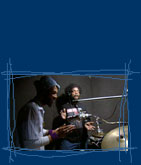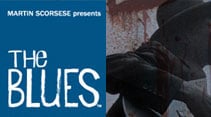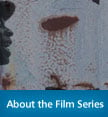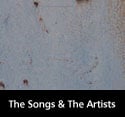








|


What's unique about this documentary series is that there's an overall historic narrative on the
blues, but unlike the more traditional approach, here we have all these directors picking a part
of that story and that chronology and then diving in and somehow personalizing it.
Chicago blues and Chess Records have always been my love, since I was a kid. The
first Paul Butterfield Blues Band album originally got me into the Chicago blues during the summer
of '65. We used to look at that album cover that showed one of the first interracial bands. Sam Lay,
the black drummer, was the coolest — it was like, "That's what we want to be like." So with
this film, I got to come full circle and go back to where it all started.
For me, rock and roll comes out of the Chess Records sound — Muddy Waters,
Howlin' Wolf, Little Walter, Koko Taylor, Chuck Berry, Bo Diddley. That whole world was a
revelation to me. I was thirteen, fourteen years old and listening to rock and roll, but I didn't
realize where it came from. Rock and roll had an element of danger, and it was sex, it was
liberated, it was bohemian, but I didn't realize it came out of Chicago.
Marshall Chess, the son of Chess Records co-founder Leonard Chess, has obviously
been radioactively supercharged by being exposed at a young age to all these great blues artists.
He had to calm down by being the Rolling Stones' manager for ten years. This story of Chess we
tell in the film is his personal story — his family's story. We decided to take his personal
story, which encompasses all this great music, and hook it up with today's younger generation. We
wanted this music to come alive — not come across as a thing of the past. This music is now;
you feel the beat, you feel it in your gut.
Marshall called me one day and said, "You're not going to believe this, but I
just got an e-mail from Chuck D. He read Spinning Blues Into Gold, the
book on the Chess family that Nadine Cohodas wrote, which is a great book. Chuck D said, 'It was
Electric Mud' — Muddy Waters' blues-rock album produced in 1968 by
Marshall — 'that got me into this. I hear you're going to do this film trying to connect the
blues and hip-hop, and I'm down.'" This was literally an act of fate, and it became the inciting
incident in Godfathers and Sons. What personalized the film was the idea
that not only is the story intergenerational, but it's a family story, it's black and white, it's
blacks and Jews, it's all these connections, but it's done in a very real, natural way, and it
just happened. We didn't write it. We were searching for it, wondering what it would be. But
Chuck D just sat down one day at his keyboard and sent that message into cyberspace, and that's
what started it.
When we began talking about the film, we wondered about the connection between
blues and hip-hop. Rock and roll and the blues is easy, and there have been many films and
books about that connection. The bluesmen were the fathers and the rock and rollers were the
sons. But somehow the grandkids got lost, because hip hop was a whole new thing, and it wasn't
built around an electric guitar. It was built around turntables and beats.
It was built around digital technology, not the amplified technology of the
electric guitar, which was what blues and rhythm and blues were, so, I wondered, looking at
the twelve-bar structure, What is really the connection? But then, in the film, there's that
scene at the Blues and Jazz Record Mart, where hip hop artist Juice is checking out the old
album covers, and you start looking at the personalities, you start looking at the stories
that are being told, and the whole vibe. And you see it's the same as rap music today.
When Louis Satterfield says, "My grandmother didn't want me to play music because she didn't
want me to play them blues." It was the devil's music, and it was sex, and it was all that
stuff that your parents didn't want you to do, just like hip-hop and rap. You start seeing
the similarities between the different kinds of music, and you see that every generation
has got to find its own sound. In the world we live in today, which is so instantaneous,
there are kids out there who don't even know who Chuck D is, who think that Eminem is the
man who invented rap. We move so fast, you can lose that sense of history.
I hadn't realized that Chuck D is a musicologist and historian, and that he
also has a tremendous interest in finding these parallels. There was also the indie
record-label connection: Chess was an indie record label, and hip-hop and rap were born out
of a new generation of indie record labels, which were also built on a new technology, a
digital technology. So the basic similarity is that every generation tries to find what you
would call that street, raw, real sound. That's what the Chicago blues had. That's what lit
the imagination of my generation, and every generation has to find its way to turn on and
light the fire — that's the source. "This world may put you down, but no, you don't
have me down. Not tonight, you don't!" Koko Taylor said that, which is interesting because
we shot a good part of this at her club, and I thought that was an interesting comment. She
said, "People say the blues, and you think it's about the sorrows in your life and the
difficulties and the troubles — obviously, a lot of music is that. But my blues
inspire you. My blues makes you want to get up and dance." And I think that is the common
bond, and that you want to make that connection. The album Fathers and Sons
that Marshall produced back in 1968, which had members of the Paul Butterfield
Blues Band — Paul Butterfield, Mike Bloomfield, and Sam Lay, playing with Muddy
Waters and Otis Spann — it was those guys doing it, connecting it. And this
generation is just beginning, it's kind of worked its way back, it's gotten to funk and
soul, and now it is about to discover the blues, the source.
Another level of this whole thing is that great art, great culture, great
music are created sometimes in the craziest ways, in the most spontaneous ways, in the
most insane ways. I've always believed that blues and jazz have that aesthetic, which is:
You find the continuity in chaos, you find the inspiration, and you let go. That
influenced me deeply as a filmmaker. It's what makes it authentic. Meeting a lot of these
characters with Marshall and Chuck just reinforced that belief. In other words, that's
what everybody wants to try to get: What is real? As Chuck says, "What was the Chess
sound?" It was the raw, real sound. Why did the Rolling Stones want to record in Chess
studios? It had that authenticity, that sense that this is really it. And that kind of
feeling just can't ever be truly programmed. In the end there is something spontaneous
and alive that moves you. As Willie Dixon said, "The blues are the roots and everything
else is the fruits."
—Marc Levin
|






|











